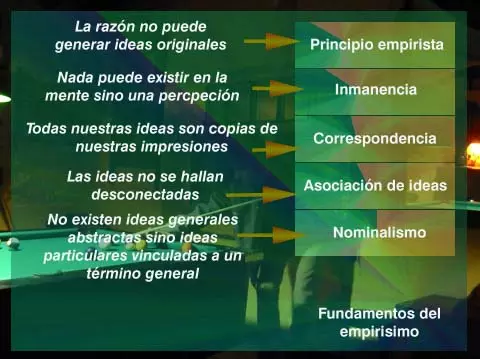 “ All materials of thinking are derived from our external or internal sensations. Only the mixture and composition of these belongs to the spirit and the will. Or, to express myself in a philosophical language: all our ideas, or weaker perceptions, are copies of our more vivid impressions or perceptions” Research on human understanding, Hume
“ All materials of thinking are derived from our external or internal sensations. Only the mixture and composition of these belongs to the spirit and the will. Or, to express myself in a philosophical language: all our ideas, or weaker perceptions, are copies of our more vivid impressions or perceptions” Research on human understanding, Hume
David Hume, as an empiricist philosopher, will argue that all knowledge comes from experience, be it external experience (that comes from sensory organs) or intimate experience (self-experience). In this line, Hume's work aims to examine in an analysis of the facts of one's own experience (what we would now call “psychic facts”), what he will call perceptions of the spirit, understanding by perception, any state of consciousness.
Some perceptions rare received directly, Hume divides them into:
Impressions of sensation (senses): e.g. color, taste.
Impressions of reflection (interiority): e.g. sadness, anguish.
The original impressions or representations differ from indirect or derived ideas or perceptions such as memory and fantasy. Since remembrance is not an original state but derived from an impression, something similar happens with fantasy regarding the future.
“ With the term impression I mean, all our most vivid perceptions when we hear or see or feel or love and hate or desire or want. And impressions are distinguished from ideas - which are the less vivid perceptions that we are aware when we reflect on any of those sensations or movements mentioned above.” Research on human understanding, Hume
It will add Hume, that both ideas and impressions can be both complex or simple as long as they can break down or not.
In summary, for Hume, all our knowledge derives either directly or indirectly from impressions. Even the most complex ideas, those that at least at first examination, seem further away from sensitivity. A detailed examination would always refer to the fact that the origin of such ideas lies in an impression. Hume says, for example, that one can get an idea of a mountain of gold and might believe that it is an original production of one's mind, however, it is only a combination operated by the mind from bringing together the idea of another and the mountain, ideas derived from previous impressions.
Indeed, for Hume, the human spirit has no other possibility than to synthesize, compose, divide, and juxtapose the material supplied by the prints. In this sense, the activity of the spirit responds to the laws of association of ideas, namely:
Association by likeness
Association by contiguity in time and space
Association by cause and effect
 “ All materials of thinking are derived from our external or internal sensations. Only the mixture and composition of these belongs to the spirit and the will. Or, to express myself in a philosophical lneguaje: all our ideas, or weaker perceptions, are copies of our more vivid impressions or perceptions” Research on Human Understanding, Hume
“ All materials of thinking are derived from our external or internal sensations. Only the mixture and composition of these belongs to the spirit and the will. Or, to express myself in a philosophical lneguaje: all our ideas, or weaker perceptions, are copies of our more vivid impressions or perceptions” Research on Human Understanding, Hume
The arguments on which Hume will try to prove the empiricist principle will be:
Even in this regard he will say that the idea of God (to be infinitely intelligent, wise, and good) arises by reflecting upon the operations that occur in our own spirit upon which we unlimitedly increase the qualities of goodness and wisdom.